|
The control line stunt pattern in effect for 1957 is shown in this article
from American Modeler in that year. The stunt pattern has undergone
numerous changes in the past many decades, so competition flyers have needed
to keep abreast of the most current rules. Airplanes have undergone many
changes as well, partially driving the rules changes. There are now official
contest events for Old Time Stunt (OTS) that use models and a pattern from
prescribed eras: "Old-Time Stunt models are those designed, built, flown
and/ or published before the last day of 1952; Classic models are the models
categorized with the same criteria but before the last day of 1969" (per
the
AMA). A big change from then until present day 'Control
Line Precision Aerobatics' is the awarding of up to 20 points for appearance.
I suppose that is partly to reward builders for daring to actually fly their
best models rather than keeping them as Hangar Queens, with an occasional
flight with low risk maneuvers. Scale builders have to fly their best work,
but then they are not expected to perform clover leafs with them. Another
noticeable change is the elimination of the climb and dive maneuver.
Official 1957 AMA C/L Stunt Patterns
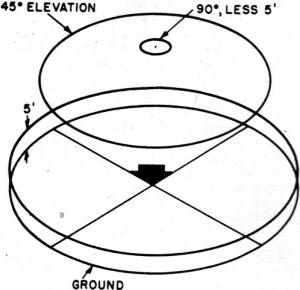 Exciting
news for control line modelers are the AMA's 1957-58 stunt regulations.
We present here the new flight patterns and a briefed version of the rules. Exciting
news for control line modelers are the AMA's 1957-58 stunt regulations.
We present here the new flight patterns and a briefed version of the rules.
All maneuvers are scored on basis of maximum 40 points, minimum 10 points
unless otherwise listed. A complete new rules book may be had from the AMA
for 25¢; it contains all events.
Starting: Take-off within 1 minute from time prop is
flipped, 5 points; starting after 1 minute, no points.
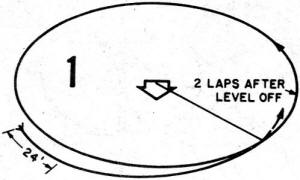 Take-Off:
Correct when model rolls smoothly along ground for not less than 15', rises
smoothly into air with gradual climb, smooth level-off at normal flight
altitude. Model continues for 2 smooth laps of normal level flight to point
of original level-off. Diagram # 1. Take-Off:
Correct when model rolls smoothly along ground for not less than 15', rises
smoothly into air with gradual climb, smooth level-off at normal flight
altitude. Model continues for 2 smooth laps of normal level flight to point
of original level-off. Diagram # 1.
Errors: Bounces or becomes airborne too soon. Take-off, climb
or level-off not gradual, smooth. Level-off, normal level flight not within
4-6' altitude. }
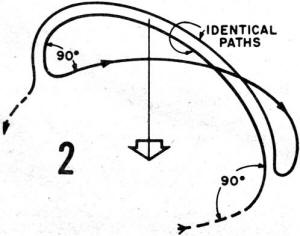 Reverse
Wing-Overs (1 Req'd.): Correct when started from normal level flight,
makes vertical climb and dive, passes directly over flyer's head, cuts ground
circle in half, recovers in inverted position at normal flight level. Continues
for half lap inverted to starting point, makes vertical climb and dive over
center of circle from inverted flight, recovers in normal level flight.
Diagram #2. Reverse
Wing-Overs (1 Req'd.): Correct when started from normal level flight,
makes vertical climb and dive, passes directly over flyer's head, cuts ground
circle in half, recovers in inverted position at normal flight level. Continues
for half lap inverted to starting point, makes vertical climb and dive over
center of circle from inverted flight, recovers in normal level flight.
Diagram #2.
By tracing the drawing above on clear plastic in black india ink, you
achieve a 3-dimensional type of illustration by superimposing it over each
stunt - just cover the white guide arrows with the black one.
Illustrations are for counterclockwise flying (from your right to your
left) and as viewed from outside the circle as you face the flyer.
Errors: First Half-Starts at other than normal level flight,
wobbles, mushes into climb. Does not cross directly over flyer's head. Does
not cross circle in straight line. Wobbles, mushes or recovers at other
than normal flight level inverted. Does not cut circle in same position
and direction in 2nd part. Second Half-Scored same as first, reversing entry
and recovery positions.
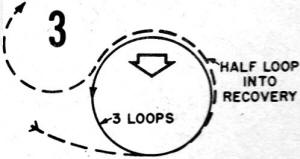 Consecutive
Inside Loops (3 Req'd.): Correct when started from normal level
flight; makes 3 smooth, round loops, all in same place with bottoms at normal
level flight altitude and tops with line(s) at 45°. Continues for another
half loop, recovering inverted, descends to normal flight level, flys 1
lap before Inverted Flight judging. Diagram #3. Consecutive
Inside Loops (3 Req'd.): Correct when started from normal level
flight; makes 3 smooth, round loops, all in same place with bottoms at normal
level flight altitude and tops with line(s) at 45°. Continues for another
half loop, recovering inverted, descends to normal flight level, flys 1
lap before Inverted Flight judging. Diagram #3.
Errors: Loops rough, irregular (egg-shaped, hexagonal).
Bottoms not at 4-6' height. Tops vary more than 2' plus or minus of 45°
point. Second and 3rd loops vary more than 2' from path of first.
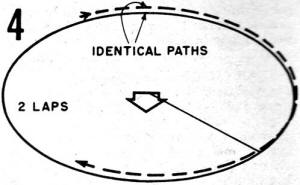 Inverted
Flight (2 Laps): Correct when makes 2 smooth, stable laps at normal
level flight altitude. Diagram #4. Inverted
Flight (2 Laps): Correct when makes 2 smooth, stable laps at normal
level flight altitude. Diagram #4.
Errors: Altitude not 4-6'. Altitude varies more than 2'.
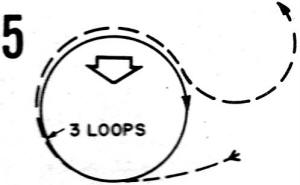 Consecutive
Outside Loops (3 Req'd.): Correct when started inverted at normal
flight level, makes 3 smooth, round loops, all in same place, with bottoms
at normal level flight altitude, tops with line(s) at 45°. Continues
for half loop, recovering in normal flight. Diagram #5. Consecutive
Outside Loops (3 Req'd.): Correct when started inverted at normal
flight level, makes 3 smooth, round loops, all in same place, with bottoms
at normal level flight altitude, tops with line(s) at 45°. Continues
for half loop, recovering in normal flight. Diagram #5.
Errors: Loops rough, irregular (egg-shaped, hexagonal). Bottoms
not at 4-6' height. Tops vary more than 2' plus or minus of 45° point.
Second and 3rd vary more than 2' from path of first.
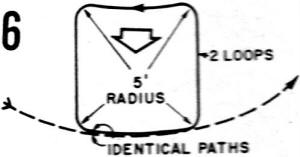 Consecutive
Inside Square Loops (2 Req.): Correct when started from normal
level flight, flies sqare course of 2 loops, each with 4 turns of approx.
5' radius and straight, equal length segments, bottom segments at normal
level flight altitude, top segments at 45°. Begins and ends in level
flight at point of start of first turn. Diagram #6. Consecutive
Inside Square Loops (2 Req.): Correct when started from normal
level flight, flies sqare course of 2 loops, each with 4 turns of approx.
5' radius and straight, equal length segments, bottom segments at normal
level flight altitude, top segments at 45°. Begins and ends in level
flight at point of start of first turn. Diagram #6.
Errors: Wobbles, mushes on turns. Lower altitude not 4-6'. Upper
altitude not within 2' of 45° point. Turns not precise, exceed 7' radius.
Sides not equal. Second not in same path.
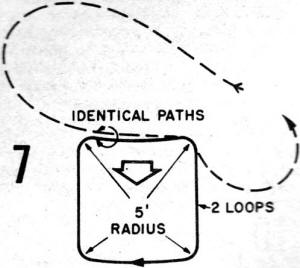 Consecutive
Outside Square Loops (2 Req'd.): Correct when started from level
flight at 45° elevation, flies square course (starting with vertical
dive) f 2 loops, each with 4 outside turns of approx. 5' radius and straight,
equal length segments, bottom sements at normal level flight altitude, top
segments at 45°. Begins and ends in level flight at point of start of
first turn. Recovers into normal level flight within quarter lap. Diagram
#7. Consecutive
Outside Square Loops (2 Req'd.): Correct when started from level
flight at 45° elevation, flies square course (starting with vertical
dive) f 2 loops, each with 4 outside turns of approx. 5' radius and straight,
equal length segments, bottom sements at normal level flight altitude, top
segments at 45°. Begins and ends in level flight at point of start of
first turn. Recovers into normal level flight within quarter lap. Diagram
#7.
Errors: Wobbles, mushes on turns. Lower altitude not 4-6'. Upper
altitude not within 2' of 45° point. Turns not precise, exceed 7' radius.
Sides not equal. Second not in same path.
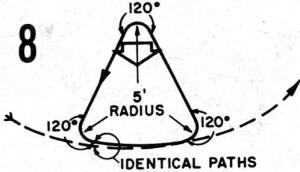 Consecutive
Inside Triangular Loops (2 Req'd.): Correct when started from normal
level flight, turns 120°, proceeds upward and backward to 45° elevation,
turns 120°, flies downward to make another 120° turn into normal
flight altitude, returning to starting point of first turn, flies identical
2nd loop in same path. Corners must be smooth, precise and approx. 5' radius.
Diagram #8. Consecutive
Inside Triangular Loops (2 Req'd.): Correct when started from normal
level flight, turns 120°, proceeds upward and backward to 45° elevation,
turns 120°, flies downward to make another 120° turn into normal
flight altitude, returning to starting point of first turn, flies identical
2nd loop in same path. Corners must be smooth, precise and approx. 5' radius.
Diagram #8.
Errors: Starts at other than 4-6' height. Turns rough, wobbly,
or exceed 7' radius. Peak of 2nd turn not within 2' of 45° point. Sides
wobbly, not equal in length. Second loop not in same path.
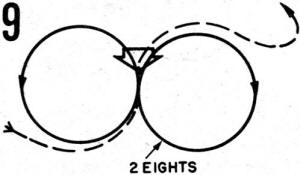 Horizontal
Eights (2 Req'd): Entered at intersection point of circles, exit
at same point. Either inside or outside loop may be flown first. Correct
when model makes two eights, each 2 round circles or loops of same size,
tangent to each other, in horizontal line. Model must enter 8 from normal
flight, be vertical at intersection point of tangency of circles. Eights
must be symmetrical. At top of each circle model must be at 45° point;
bottoms of circles must be at normal flight altitude. Diagram #9. Horizontal
Eights (2 Req'd): Entered at intersection point of circles, exit
at same point. Either inside or outside loop may be flown first. Correct
when model makes two eights, each 2 round circles or loops of same size,
tangent to each other, in horizontal line. Model must enter 8 from normal
flight, be vertical at intersection point of tangency of circles. Eights
must be symmetrical. At top of each circle model must be at 45° point;
bottoms of circles must be at normal flight altitude. Diagram #9.
Errors: Model not vertical at entry. Top of circles not within
2' of 45° point. Bottoms not within 4-6' height. Not round, equal in
size. Point of intersection varies. Second 8 not in same position.
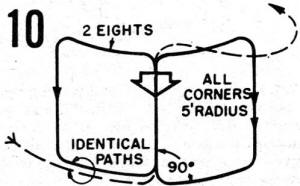 Square
Horizontal Eights·(2 Req'd.): Entered at intersection point of
squares, exit after completion of two eights is made from same point. Either
inside or outside loop may be flown first. Correct when model starts vertical
climb, makes correct square cornered loop followed by reverse square cornered
loop ending with vertical climb at same point. Maneuver repeated to form
two eights. Tops of loops must be at 45°, bottoms at normal flight height,
all corners smooth, precise approx. 5' radius. Diagram # 10. Square
Horizontal Eights·(2 Req'd.): Entered at intersection point of
squares, exit after completion of two eights is made from same point. Either
inside or outside loop may be flown first. Correct when model starts vertical
climb, makes correct square cornered loop followed by reverse square cornered
loop ending with vertical climb at same point. Maneuver repeated to form
two eights. Tops of loops must be at 45°, bottoms at normal flight height,
all corners smooth, precise approx. 5' radius. Diagram # 10.
Errors: Corners exceed 7' radius, sides not square and equal
length. Loops not equal in size. Sides not square horizontally, vertically.
Tops vary from 45° point more than 2': Bottoms not within 4-6' height.
Point of intersection varies. Second 8 not in same position.
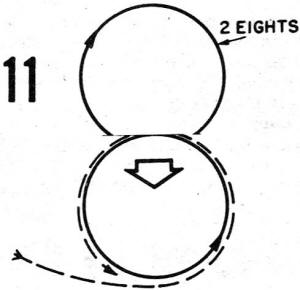 Vertical
Eights (2 Req'd.): Entered at 45° point, exit from same point.
Either inside or outside loop may be flown first. Correct when model makes
two eights, each 2 round circles or loops of same size, tangent to each
other, in vertical line. Enter in inverted flight, be horizontal at intersection
point or tangency of circles. Eights must be symmetrical, tops at point
5' less than 90° directly above flyer's head, bottoms at normal level
flight altitude. Diagram #11. Vertical
Eights (2 Req'd.): Entered at 45° point, exit from same point.
Either inside or outside loop may be flown first. Correct when model makes
two eights, each 2 round circles or loops of same size, tangent to each
other, in vertical line. Enter in inverted flight, be horizontal at intersection
point or tangency of circles. Eights must be symmetrical, tops at point
5' less than 90° directly above flyer's head, bottoms at normal level
flight altitude. Diagram #11.
Errors: Model not horizontal at entry. Entry not within 2' of
45° point. Tops of eights not 3-7' less than 90° point. Bottoms
not at 4-6' height. Loops not round, equal. Point of intersection varies.
Second eight not in same position.
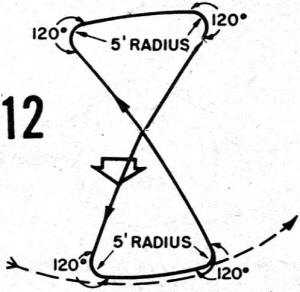 Hourglass
(1 Req'd.): Correct when model starts from normal level flight, makes abrupt,
smooth turn of 120° into inverted climb, turns 120° into level flight
at altitude 5' less than 90° point above flyer's head, flies level distance
of half total climb, turns 120°, dives at inverted angle to complete
hourglass, recovers with 120° turn at point directly below upper left
corner of figure, into normal level flight. Flight paths of climb and dive
cross at 45° point. Maneuver consists of two triangles, one directly
above other, with segments of each triangle of equal length. Diagram #12. Hourglass
(1 Req'd.): Correct when model starts from normal level flight, makes abrupt,
smooth turn of 120° into inverted climb, turns 120° into level flight
at altitude 5' less than 90° point above flyer's head, flies level distance
of half total climb, turns 120°, dives at inverted angle to complete
hourglass, recovers with 120° turn at point directly below upper left
corner of figure, into normal level flight. Flight paths of climb and dive
cross at 45° point. Maneuver consists of two triangles, one directly
above other, with segments of each triangle of equal length. Diagram #12.
Errors: Starts at other than normal level flight at 4-6' height.
Turns rough, wobbly or exceed 7' radius. Top at an elevation 3-7' less than
90° . Triangle segments not equal length. Termination of dive not directly
beneath point where climb terminated. Recovery not at normal level flight
altitude.
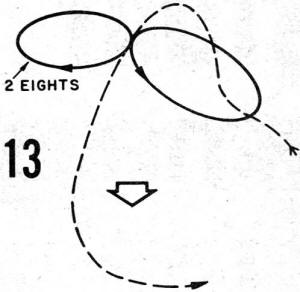 Overhead
Figure Eights (2 Req'd.): Entered at intersection point of circles,
directly over flyer's head, exit from same point. Either inside or outside
loop may be flown first. Correct when model makes two eights, each two round
circles of same size, with intersection or point of tangency directly over
flyer's head. Model must enter eights with vertical climb through center
of circle, must always point in this direction at, center of eights. Eights
must be symmetrical, model at lowest point of each circle at 45° elevation.
Diagram #13. Overhead
Figure Eights (2 Req'd.): Entered at intersection point of circles,
directly over flyer's head, exit from same point. Either inside or outside
loop may be flown first. Correct when model makes two eights, each two round
circles of same size, with intersection or point of tangency directly over
flyer's head. Model must enter eights with vertical climb through center
of circle, must always point in this direction at, center of eights. Eights
must be symmetrical, model at lowest point of each circle at 45° elevation.
Diagram #13.
Errors: Model not vertically overhead at entry. Low points of
circles not within 2' of 45° point. Loops not round, equal. Point of
intersection varies. Second eight not in same position.
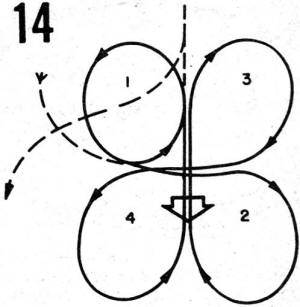 Four-Leaf
Clover (1 Req'd.): Four-Leaf
Clover (1 Req'd.):
Correct when model starts from 45° elevation point, performs inside
loop (upper left), flies level distance equal to diameter of loop, completes
three-fourths of outside loop (lower right), climbs vertically distance
equal to diameter of first loop, completes. three-fourths of another outside
loop (upper right), flies inverted distance equal to diameter of first loop,
completes three-fourths of inside loop (lower left). As tangency point between
lower left and lower right loops is reached, model climbs vertically through
four-leaf clover, recovers into normal level flight. Diagram #14.
Errors: Entry not within 2' of 45° point. Loops rough, not
equal. Paths connecting loops not properly horizontal or vertical according
to maneuver sketch. Bottoms of lower loops not at 4-6' height. Tops of upper
loops not 3-7' below 90° point over flyer's head. Loops not properly
tangent to form square pattern. Model recovers before flying vertically
through pattern.
Landing: Correct when model lands smoothly with no bounce
or unusual roughness, comes to stop without touching any part to ground
other than landing gear. Wheel or 3-point landings permissible. Maximum,
40; Minimum, 0.
Errors: Scored anytime model bounces or touches any part of
model to ground other than landing gear. Crash, flipover, belly, upside-down
landing receives no score. Any unusual circumstances surrounding above errors
which may cause an error not within pilot's control will be judged accordingly.
Posted July 26, 2014
|



